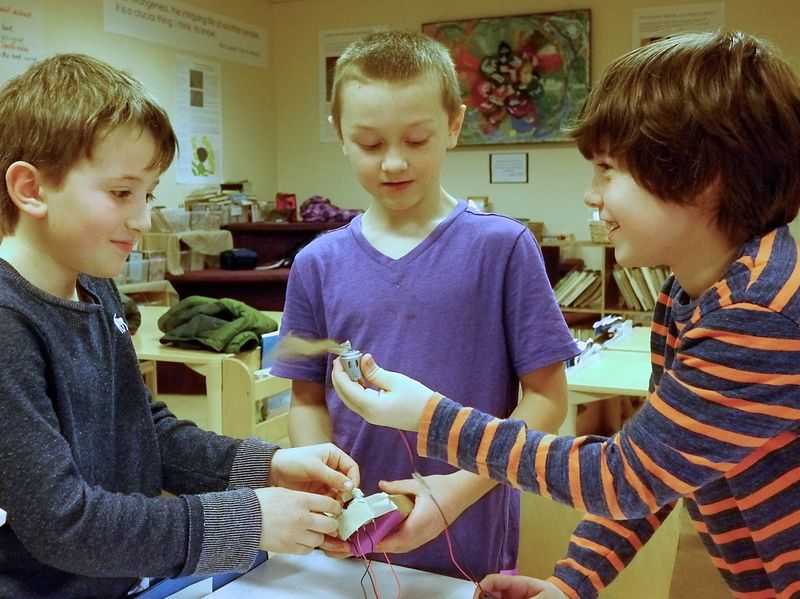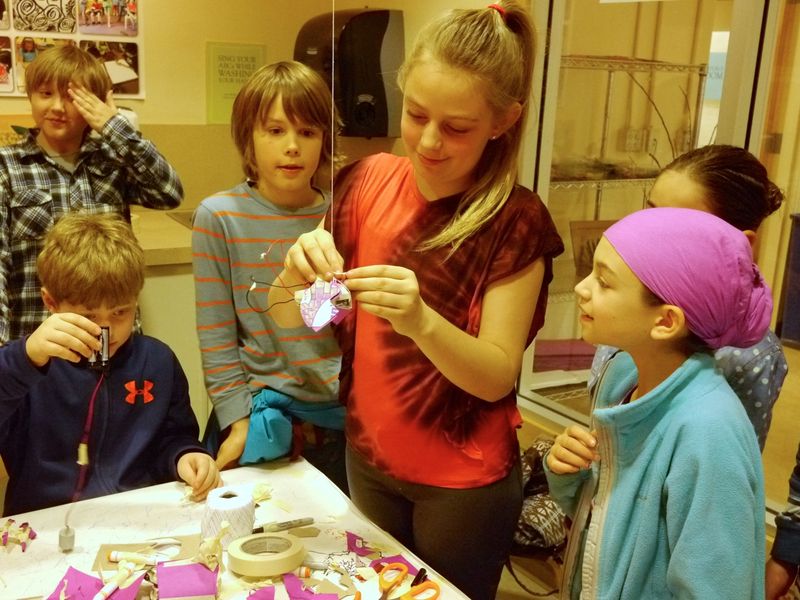Opal Parents Chime In


At the edge of spring break, there is much in the air. In the last week, we’ve had glorious sunny days transforming to downpours and windstorms.
Living in the tempest, it’s nice to receive missives from beyond. This week, two messages from parents of students buoyed my spirits. Both provide windows into how Opal School families view their children’s experience. Because that’s a perspective rarely shown on the Opal School Blog, I share them with you here.
The first message requires a little context. In last week’s Opal 3 community update, Susan wrote:
On Tuesday, we read Roxaboxen by Barbara Cooney after many of the students had requested it as support for thinking about the village they are creating at Fishy Pond. This story prompted a lively discussion about governance in the village. Who would be in charge? How would we know? What would the job be of those that were in charge? Who would make the rules? What would we do if someone broke them? Who had the power to decide who’s voice would be heard or included? Z courageously struggled aloud with an idea he offered about how any “good” point would be considered by, perhaps, a “council” of an elected few — and we thought together about the challenge of who got to decide what was “good”.
So, on Wednesday, we read together Sojourner Truth’s famous speech, “Ain’t I a Woman”, given at the 1851 Women’s convention in Akron, Ohio. The children read the text closely, looking for points of fact and points of opinion. Who would get to decide whether Truth’s points were “good” or not? What was she trying to say and who was she trying to say it to?
These opportunities to connect the current, private lives of the children and their interests with the history that came before us, is a powerful opportunity to learn to think interdependently, and one of our most important goals in third grade at Opal School.
Parent SG wrote:
I just wanted to thank you for putting so much detail into the community update. I enjoyed reading it. You may be surprised to hear, as I was, that when I asked T about Sojourner Truth’s speech, he quoted a few parts of it verbatim and explained to me what it meant. Her speech made an impact on him. I thank you for providing this opportunity for children to think through another’s perspective. Its powerful.
A wonderful message to receive on a Sunday evening, it was followed by parent SB’s note today:
I heard this interview with Susan Engle on OPB yesterday morning.
As part of broader discussion about Common Core standards and standardized testing in general, she listed things she felt schools should be teaching and measuring. And as she ticked off the items on her list, it was hard not think of Opal School.
At the 6:25 mark (or there about), John Hockenberry asks, “If you were to take a design approach to school and try to come up with a way of really measuring what we want out of school, and tried to aim for that, how would you go about doing that?”
Engle’s response, in part, was that tests should measure different things when assessing schools than they currently measure. Engle said:
“So, things like curiosity, the ability to collaborate, the ability to get engaged in something and pursue it over time… If you went into a school where kids were being encouraged to ask questions and pursue the things that interested them, and help others, and engage in serious debate and argument with people they liked about topics that they cared about, you’d see good things going on in the school. You’d see students and teachers who actually liked being there together, and you could measure those things. We’ve gotten cornered into thinking that the only way of measuring things is with paper and pencil, or a computer screen… We measure all kinds of things which really matter to us, so why shouldn’t we measure the things that really matter to us in our children’s education? The single most important thing that colleges want and employers want is a love of learning. The trouble is, everyone uses that phrase (love of learning). They throw it out but they don’t really think about what it would take to instill in children a love of learning.”
So nice to know that, even when the monsoons are passing through, Opal School parents value their children’s time in a school where kids are developing a love for questions, serous debate, and taking on the perspectives of others.
Note: This week’s post features photos from our day spent tinkering with our friends from Brightworks.

